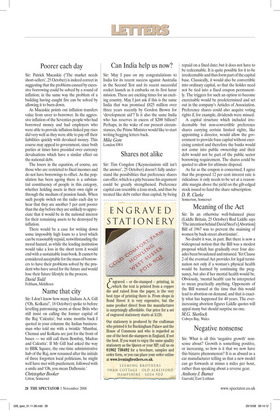Shares not alike
Sir: Tim Congdon (‘Keynesianism still isn’t the answer’, 25 October) doesn’t fully understand the possibilities that preference shares can offer, which is a pity because his argument could be greatly strengthened. Preference capital can resemble a loan stock, and thus be treated like debt rather than capital, by being repaid on a fixed date; but it does not have to be redeemable. It is quite possible for it to be irredeemable and thus form part of the capital base. Classically, it would also be convertible into ordinary capital, so that the holder need not be tied into a fixed coupon permanently. The triggers for such an option to become exercisable would be predetermined and set out in the company’s Articles of Association. Preference shares could also acquire voting rights if, for example, dividends were missed.
A capital structure which included irredeemable but non-convertible preference shares carrying certain limited rights, like appointing a director, would allow the government to provide base capital without exercising control and therefore the banks would not come into public ownership and their debt would not be part of the public sector borrowing requirement. The shares could be quoted to allow for ultimate disposal.
As far as the coupon is concerned, I agree that the proposed 12 per cent interest rate is ridiculous: it only needs to be set at a reasonable margin above the yield on the gilt-edged stock issued to fund the share subscription.
D. R. Clarke
Somerton, Somerset


































































































 Previous page
Previous page